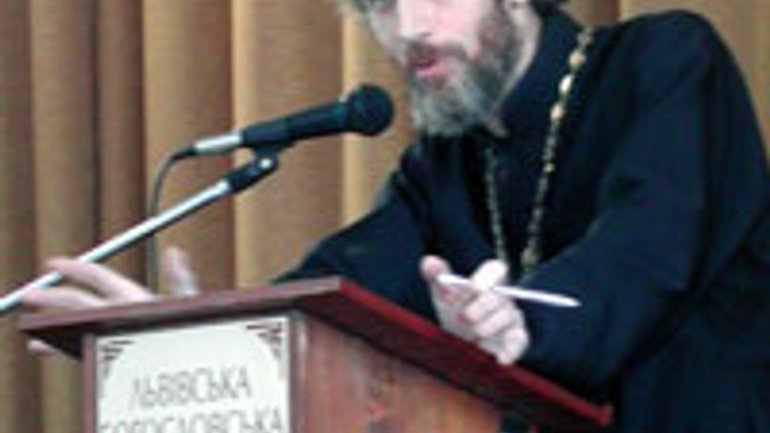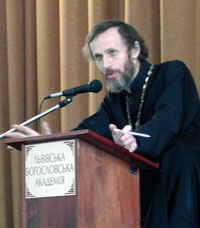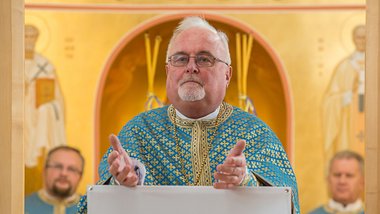Interview with abbot Veniamin Novik

"The 'proselytism card' is constantly played in Russia, although no one really knows how it differs from missionary work…"
Interview with Fr. Veniamin Novik, an Orthodox abbot from St. Petersburg (Russia)

– I would like to say a few words concerning Catholic/Orthodox relations and also the understanding of Catholicism in Russia. I'll start with the background. The cold war, which began after "hot" World War II, is not over yet. Anti-western sentiments continue to exist in Russia. They are just expressed in a different way. If earlier "the sharks of imperialism," capitalism, the West and the CIA were accused, nowadays Western Christianity, Catholicism and Protestantism undergo criticism. The fundamentalist circles of the Moscow Patriarchate unfortunately fuel such sentiments. Most priests either keep quiet or develop a loyal attitude to it, whereas the hierarchy in its turn acts quite diplomatically or at least pretends to. However, there are certain quite clamorous individuals who actually instigate anti-Catholic hysteria in Russia. There are not many of them, but they are active enough to publish anti-Catholic books, which the Russian Orthodox Church (ROC) never condemns. [Russian Orthodox Patriarch] Alexis II himself, for instance, might express his attitude about the publication of a given anti-Catholic book, which he never does. In fact, the ROC is simply afraid of such fundamentalists and does not want to deal with them. Fundamentalists even wrote a critical book about Alexis II after his trip to the USA. He had a meeting there with a rabbi and said that "we have only one God and Father," because in these two monotheistic religions, Judaism and Christianity, there is only one God and Father. They did not forgive Alexis for these words, accusing him of ecumenism.
The creation of Catholic dioceses in Russia also caused a negative reaction from the fundamentalists. They called it the expansionism of the Vatican to the East. The "proselytism card" is constantly played in Russia, although no one really knows how it differs from missionary work, and where the borderline between the two is. Interestingly enough, Protestants are not accused of proselytism, even though they are more active in terms of missionary work than Catholics. The latter, however, are always a prime target.
– Is the tension today in Orthodox-Catholic relations connected with the Pope's visit to Ukraine last year?
– The reaction to the Pope's visit to Ukraine was rather lifeless in Russia. Ukraine is an independent state; "Kyiv is the Mother of the cities of Rus," as the chronicle has it. I would say that such indifference might also be explained by apathy among the public and disinterest in religious life in Russia. Russians are facing a single problem today, survival, making both ends meet. What Russians really don't understand, or pretend not to, is that Catholicism could introduce Western culture to Russia. On the one hand, Russia wants to integrate into Europe and strives for Western living standards. Thus, if we are directed towards the West, we should welcome Western Christianity, which, in addition to bringing Jesus Christ, also brings features of Western culture. On the other hand, due to the Russian infantile consciousness, people don't realize this connection. They want to live as well as Europeans do, but without Western Christianity, without Orthodoxy and without Catholicism.
One should also bear in mind that the Catholic Church has a developed social doctrine. There's a Christian understanding of economics, politics, social life and society, which is extremely important when building the civilization of love. [Fr. Novik was in Lviv at the time of the interview to participate in a conference dedicated to "building the civilization of love."- editor's note] In 2000, the basics of the ROC's social conception were adopted at the episcopal sobor (assembly) in Moscow in the Church of Jesus the Savior, which was the first step towards the elaboration of the church's social doctrine. However, such notions as civil society, solidarity and subsidiarity, as well as a theological understanding of human rights and freedom of conscience, have, unfortunately, been left out of these basics. In my opinion, there's something we could learn from the Catholic Church in this respect.
– In the context of such relations, does a papal visit to Russia seem possible?
– I believe that, if Russia wants to integrate into Europe, a papal visit is absolutely necessary. But again, those cantankerous fundamentalist circles that exist in the Orthodox Church are simply threatening Alexis II with a schism. They say that, as soon as the Pope comes, the church will lose its unity, which is quite a frightening perspective, especially for Russia. A split in the church might be fraught with unpredictably grave consequences, which is a major reason for the patriarch's concerns. Officially, however, there are two reasons. The first reason is proselytism, or I would say, pseudo-proselytism, since the Catholic Church leads a quiet life in Russia and does almost no missionary work, receiving into Catholicism only those who come on their own free will. The second reason is the situation in western Ukraine, where the churches which Stalin, with the help of the NKVD (People's Commissariat of Internal Affairs), gave to the Moscow Patriarchate in 1946 have been returned to the Greek Catholics.
I think the major reason is that people are afraid of the fundamentalist forces within the ROC who are trying to "demonize" the Pope. He is almost depicted as a devil that should not be let into the sacred land of Rus. On the one hand, such sentiments sound funny, but, on the other, they are quite disturbing. I would compare the Russians' attitude to the Pope with that of Muslims. Note that Muslims don't like the Pope either, because he represents the Western world for them, whereas the Islamic world, as is well known, doesn't like the West. Therefore, I understand why the Pope's visit to Russia is, for now, impossible. Lay people, as a rule, are well disposed towards the Pope. I am convinced that if a poll were taken in Russia today, many Russians would be in favor of the Pope's visit. But the noisy minority, threatening to split the church, obviously hampers it.
– What is generally known about the religious life of the large Ukrainian community in Russia?
– I personally know nothing about the life of Ukrainians in Russia. The only thing I know is that there is no Greek Catholic parish in St. Petersburg. Neither are there Orthodox parishes where the services are conducted in Ukrainian, even though many of the Petersburg clergy are of Ukrainian origin. This tradition goes back to the times of Peter I, since he borrowed much from the Kyivan-Mohyla Academy. Theophan Prokopovych graduated from the Kyivan-Mohyla Academy. Therefore, there was some Ukrainian influence among the Russian Orthodox clergy, a tendency to some extent continuing even today. For instance, even before the times of perestroika, 70% of the students of the Theological Academy in St. Petersburg were Ukrainians. Today, the amount of Ukrainian students has decreased dramatically, since theological institutions have opened in Ukraine, and Ukraine, after all, is now a separate country.
– Do Ukrainians in Russia preserve their religious and national traditions? If not, what are the reasons?
– I guess one of the reasons that they don't is the massive russification of Ukraine under the communist regime. The second reason that traditions are not preserved is because the Ukrainian culture, in my opinion, differs little from the Russian. The two cultures are very similar. Therefore, there's no urgent need for a national religious minority to separate, as happens in the USA, where a Ukrainian community living in the English milieu has to identify itself in order to preserve its cultural identity. As long as Ukrainian and Russian cultures are rather similar, Ukrainians in Russia don't have to establish separate Ukrainian cultural centers. But this is only my assumption. I can't speak on behalf of all Ukrainians who live there.
– How do Russians treat Greek Catholics or Roman Catholics?
– The attitude in Russia towards Greek Catholics is much worse than towards Roman Catholics. Nobody wants to understand that Orthodox can be under the Vatican's jurisdiction. That is why there is not a single Eastern-rite Catholic parish in St. Petersburg. I noticed that, in order to avoid the Moscow Patriarchate's indignation, Catholics who live in Russia don't want to create Greek Catholic parishes. Russian Catholics don't want relations with the Moscow Patriarchate to deteriorate.
Only a sociological survey can help us find out how common people in Russia perceive Catholicism, are disposed to the Pope, and what their attitude towards his visit and Greek Catholics is. I can only comment relying on my intuition and my experience. My hunch is that, on the whole, common people have a peaceful attitude towards Catholicism and Greek Catholics. However, I am not sure they will be able to resist the pressure of propaganda by Orthodox fundamentalists of the Moscow Patriarchate, or at least remain neutral. Common people easily succumb to proselytism, especially into fundamentalism.
– How much do Russians know about religious life in Ukraine?
– Russians know practically nothing about religious life in Ukraine. One really must make an effort to get any information. Personally, I get an electronic newsletter posted by Viktor Yelenskyi. Some articles on the religious situation in Ukraine are published in the religious section of "The Russian Journal" on the Internet.
– To what extent do national and cultural features have to be expressed in Orthodoxy?
– It is very important that a global dimension develop in Orthodoxy, since sometimes it is perceived as a national religion, associated with patriotism. Of course, patriotism and national culture should be present, but Christianity should be beyond nationalities and cultures. It has a universal, global meaning, and this concept should be elaborated in Orthodoxy. Otherwise, Orthodoxy runs the risk of turning into a national feature of a local culture.
– Is the state interested in this?
– The state wants to turn the church into a national and cultural attribute, into a museum, into a culture. This is the state's attitude towards the church. However, the church should not succumb and betray its ecumenical catholic (universal) mission, since the Orthodox Church is also called a catholic church.
Brief biography
Abbot Veniamin Novik has a candidate's degree in theology. In 1976, he graduated from the Polytechnic Institute in St. Petersburg and then worked as an engineer for several years. Later he studied at the St. Petersburg Theological Academy. In 1987, he defended his dissertation. He then taught at the academy. From 1992 to 1995 he served as vice-rector of educational activities. In 1997, he was dismissed from the academy because he disapproved of the new law of the Russian Federation "On Freedom of Conscience and Religious Organizations." He is a writer, published in the journals "Issues of Philosophy," "The Continent," in the newspaper "The Russian Mind" (based in Paris), and in other publications.
Interview conducted in Lviv, April 13, 2002
by Taras ANTOSHEVSKY









